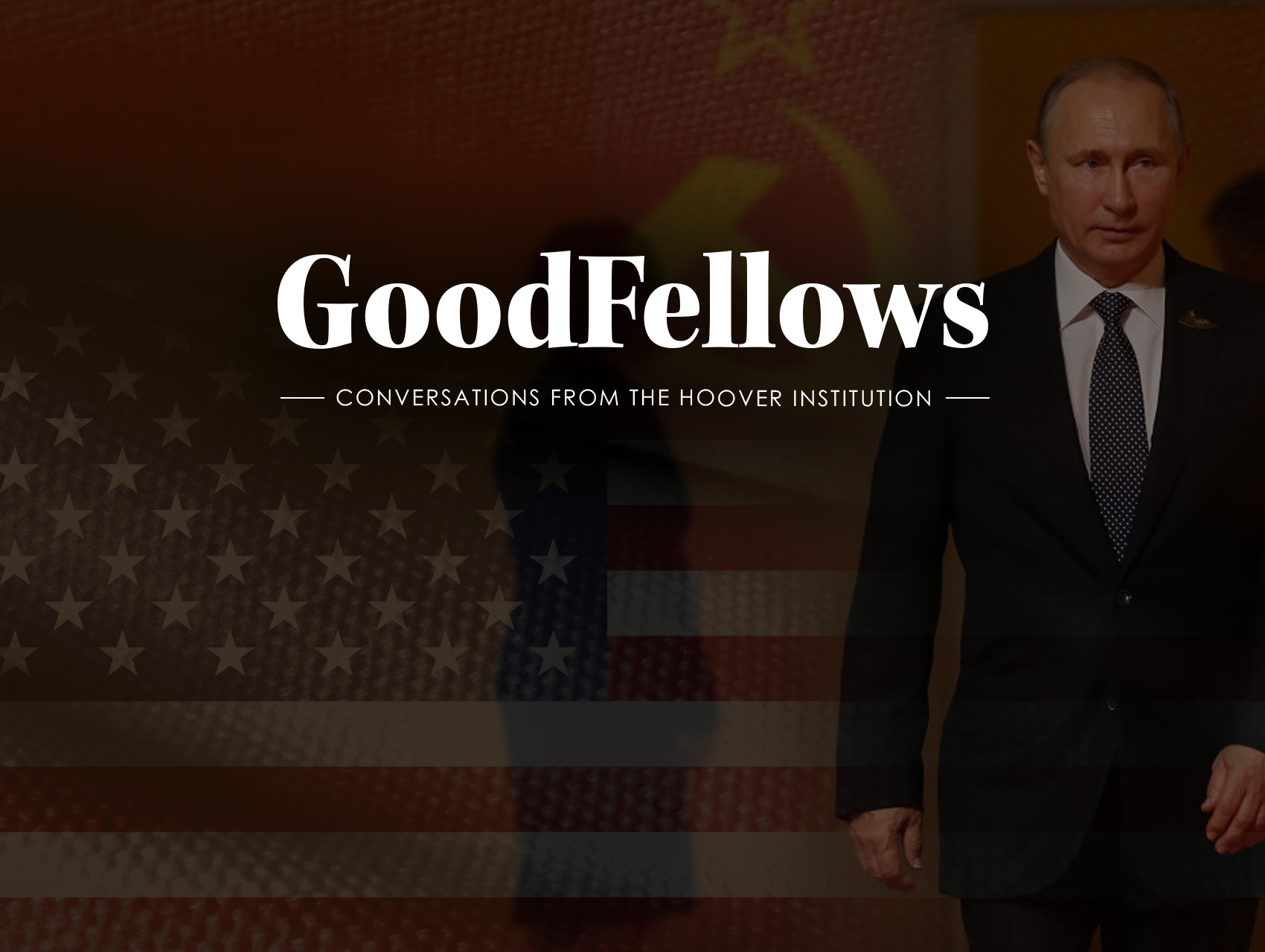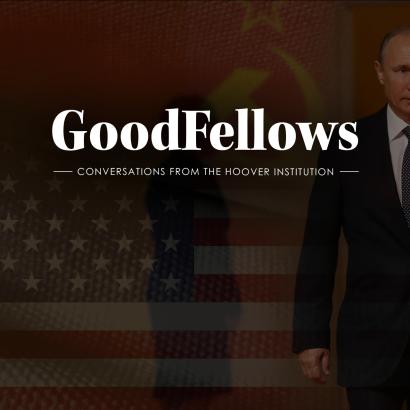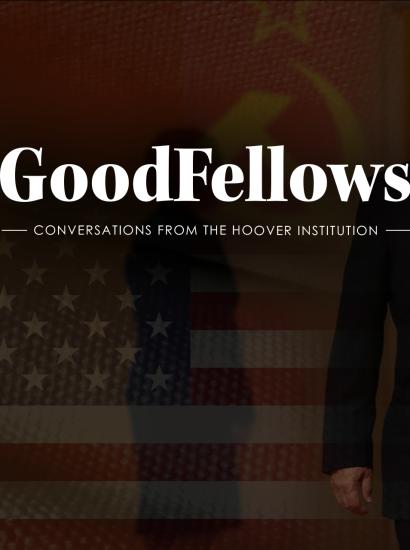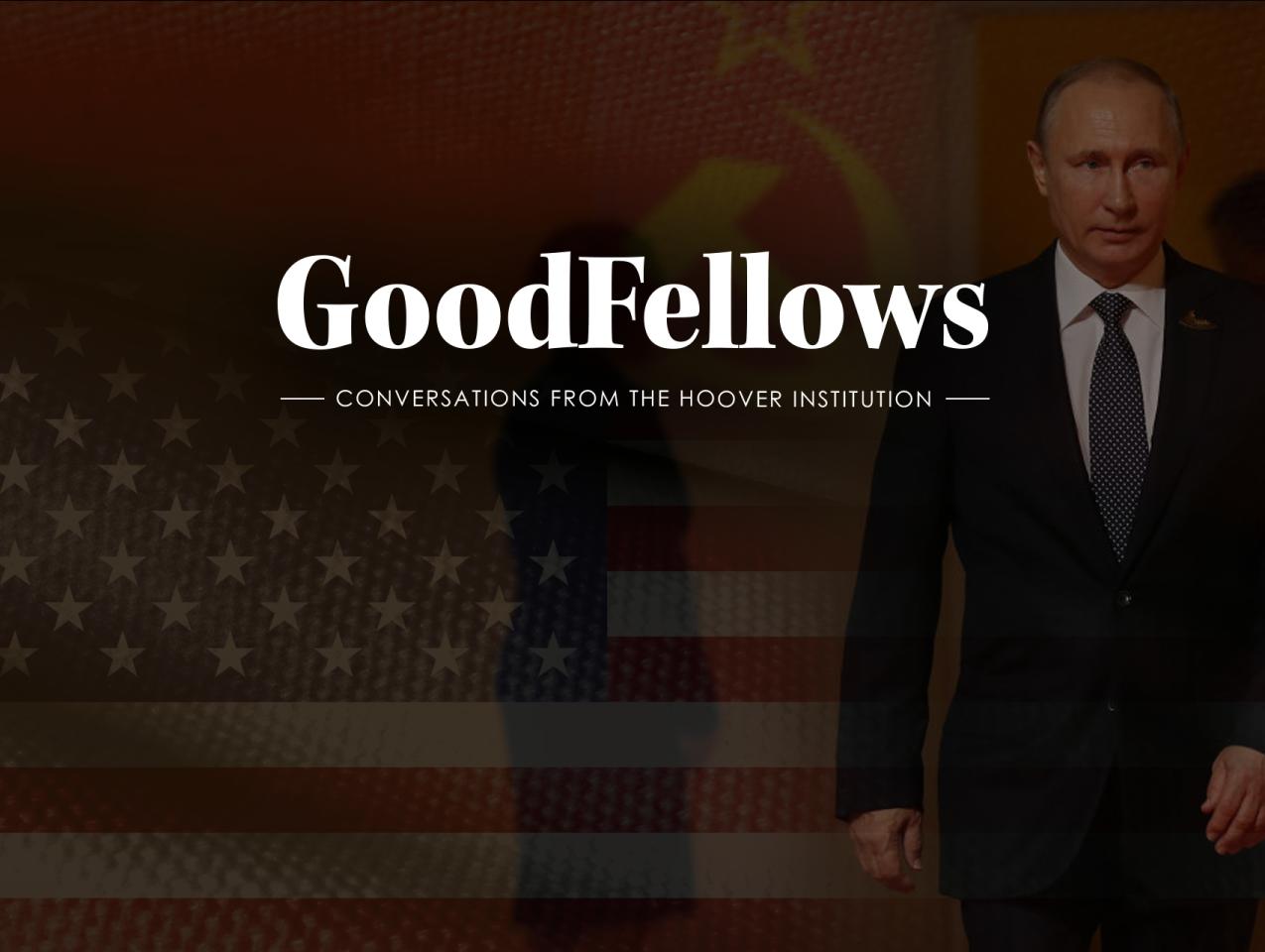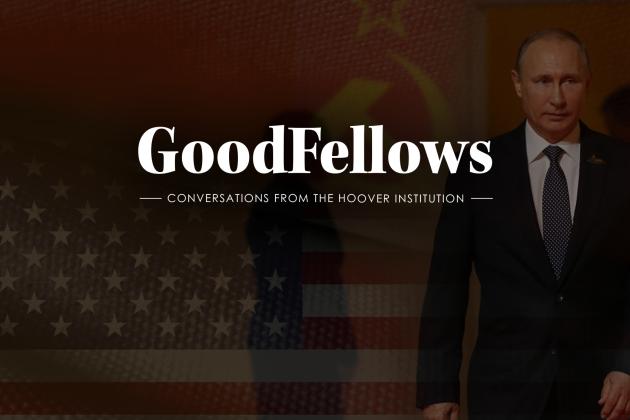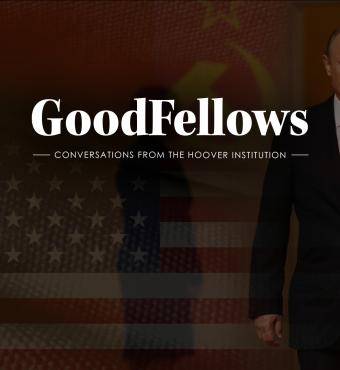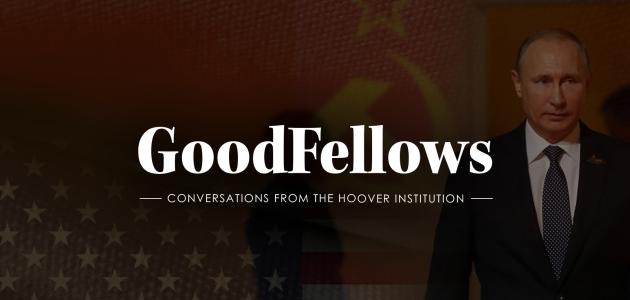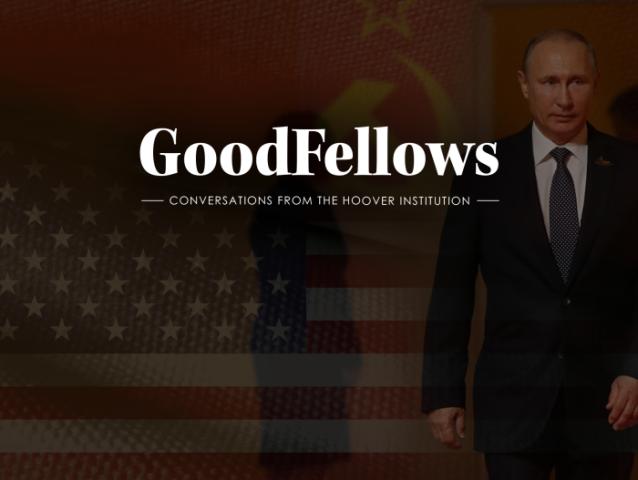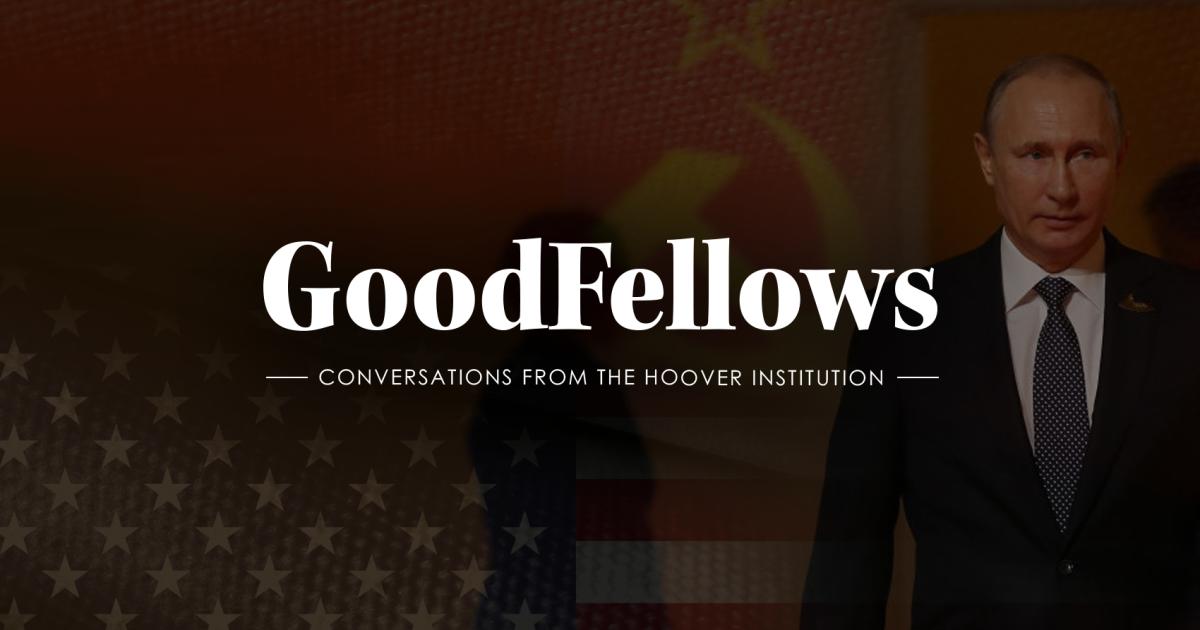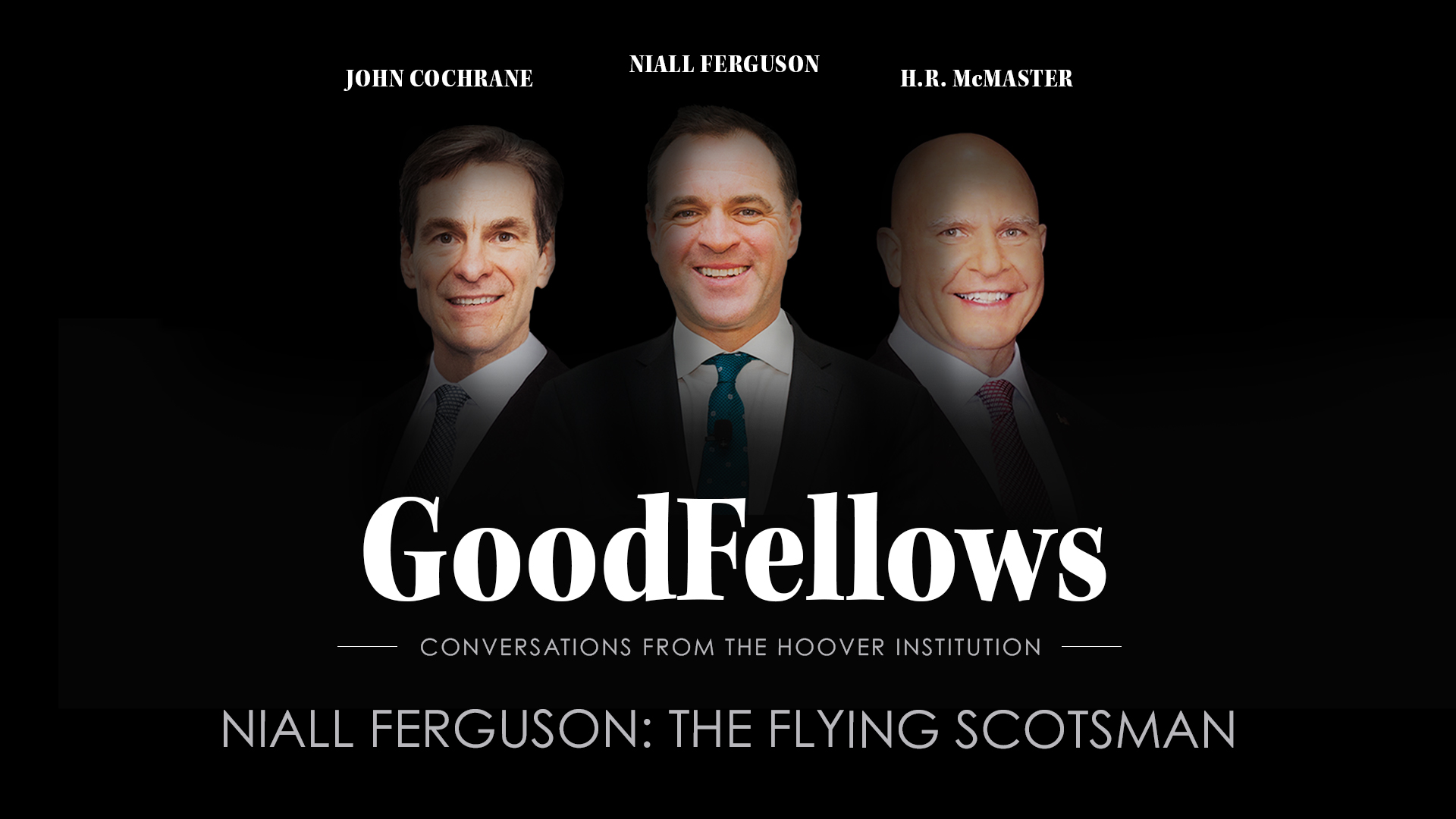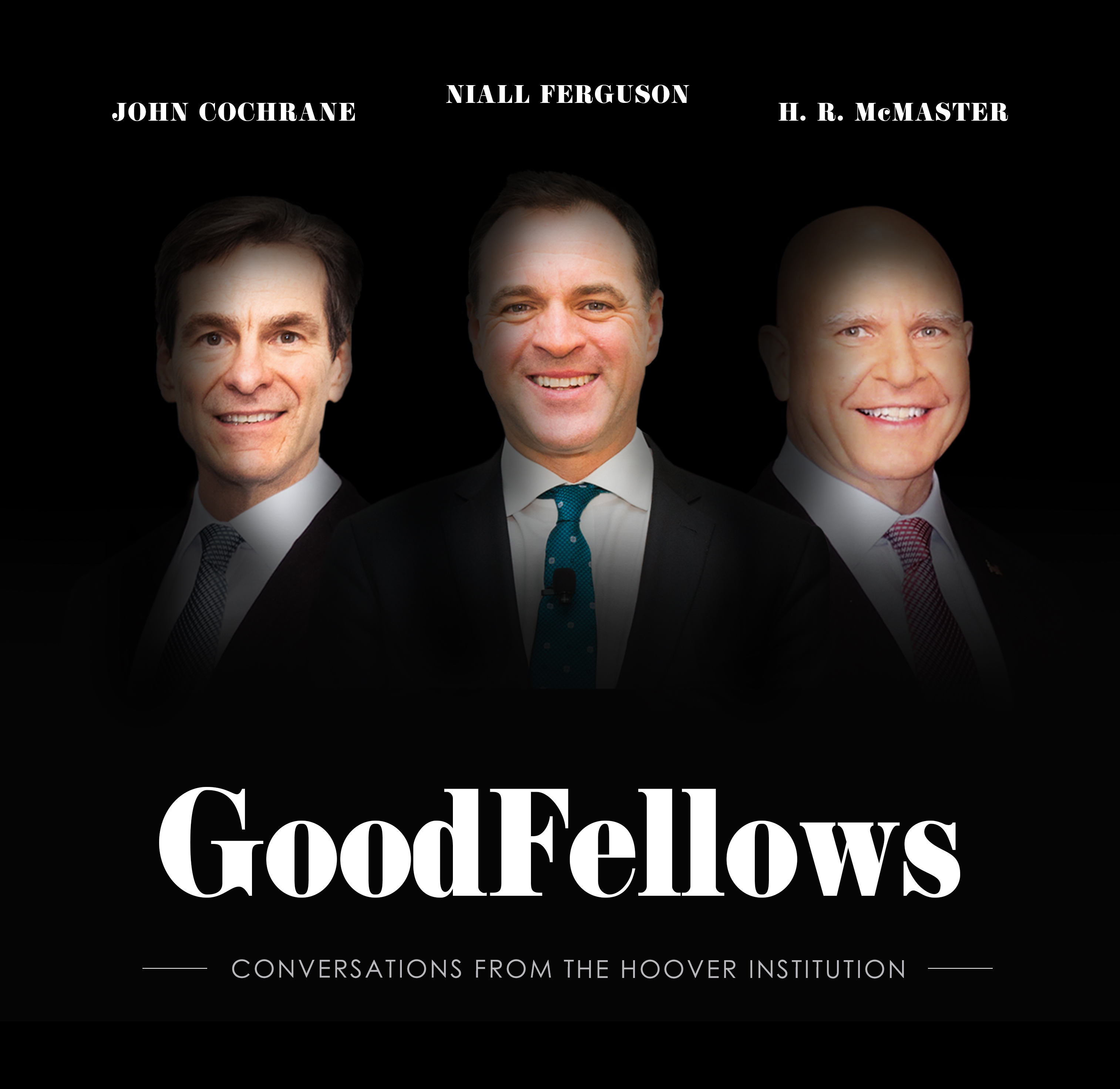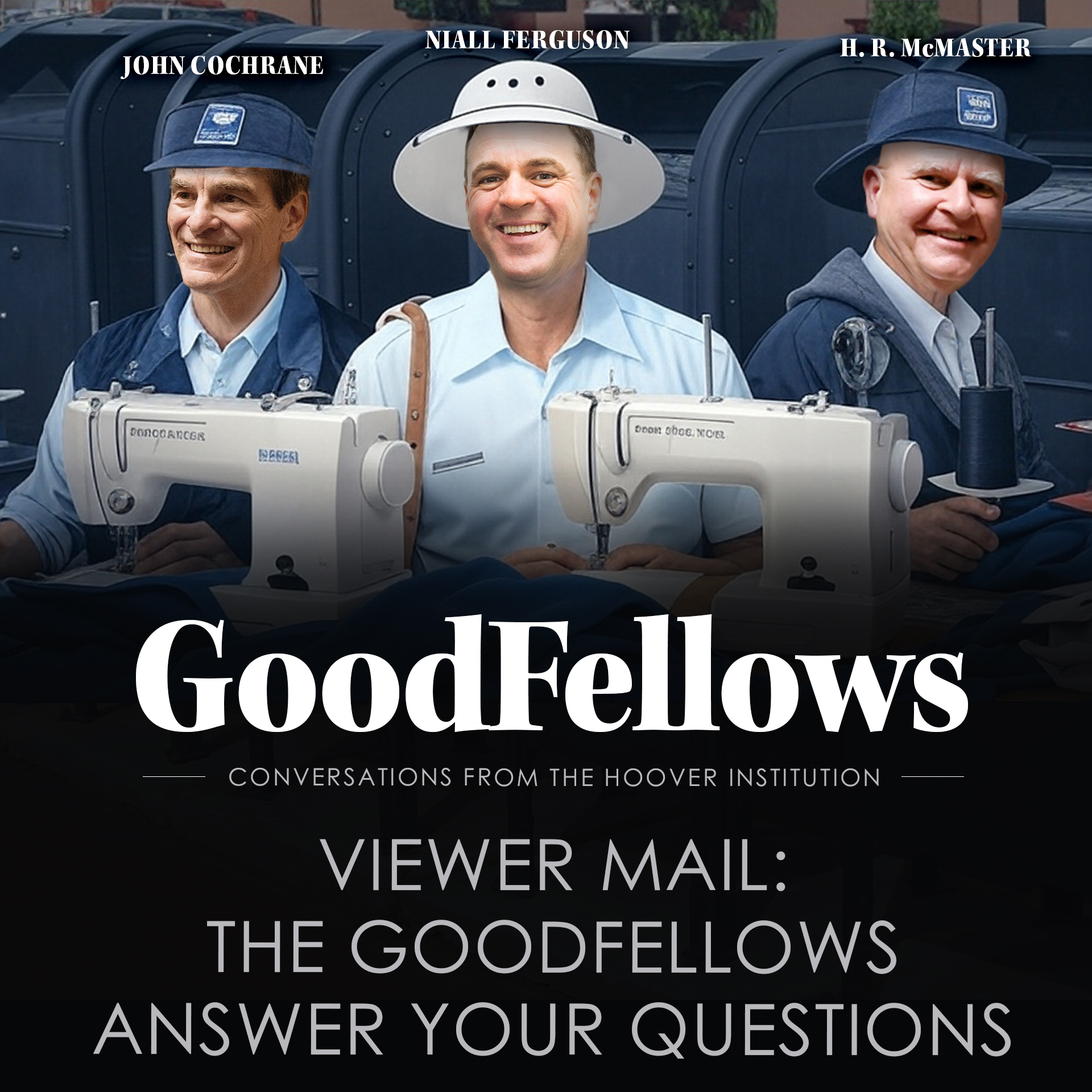- History
- Higher Education
- Revitalizing History
How does a young Scotsman go from struggling actor and failed politician to internationally acclaimed (and knighted) historian? In a solo installment of GoodFellows, Sir Niall Ferguson, Hoover’s Milbank Family Senior Fellow, discusses his academic journey, fellow historians he admires, keys to successfully multi-tasking through life, plus how he and his spouse, Hoover Research Fellow Ayaan Hirsi Ali (who also appears in this episode), are raising their two sons. Also discussed: Sir Niall’s newfound passion for sailing, his non-Scottish attitude toward golf and fishing, why he doesn’t see retirement as a viable lifestyle, plus the pride he takes in a music legend recently lauding him as the “Jimi Hendrix” of his profession.
Recorded on July 30, 2025.
>> Peter Robinson: I'm Peter Robinson of Uncommon Knowledge. To honor the remarkable scholarship of Tom Sowell, renowned economist, social theorist, public intellectual, and Hoover Senior Fellow, we're inviting everyone inspired by his work to enter two national contests. The Thomas Sowell Essay Contest is open to high school students and college undergraduates.
Students may explore a cultural issue or a policy issue through the lens of Tom Sowell's work or reflect on how Thomas Sowell changed their view of the world. He certainly changed mine. I imagine he may have changed yours. The second contest, the Thomas Sowell Video Contest. This is open to everybody.
It invites short, compelling videos, up to three minutes that answer the question, what lesson or teaching from Thomas Sowell do Americans most need to learn or remember today? Winners of each competition will receive a $5,000 prize along with paid travel and an invitation to a special celebration of Thomas Sowell that will take place here at the Hoover Institution on the Stanford University campus.
All entries are due by August 31st. Let me repeat that date. That's an important one, all entries are due by August 31st. To learn more and apply, visit hoover.org/thomas-sowell-legacy. hoover.org/thomas-sowell-legacy, thank you.
>> Speaker 2: Welcome back to Goodfellows, a Hoover Institution broadcast examining social, economic, political and geopolitical concerns. I'm Bill Whelan, I'm a Hoover Distinguished Policy Fellow, and I'll be your moderator today.
Before I go any further, I should actually correct myself. Today's show is not Goodfellows. It is Goodfellow, singular. We're going to talk to one of our trinity of Hoover Senior Fellows, and today that honor goes to the great Sir Niall Ferguson. Sir Niall is the Hoover Institution's Milbanke Family Senior Fellow.
He is, of course, one of the world's preeminent historians, author of numerous books, columnists. You mentioned it. Niall, great to see you.
>> Niall Ferguson: It's very good to be with you. Though it feels a little strange, just the two of us.
>> Bill Whalen: Does feel strange, but it also feels like deja vu, Niall, because I'm looking at that background and I'm getting very serious 2020 pandemic vibes.
Where are you?
>> Niall Ferguson: Well, I am in Montana, and regular or early adopters, I should say, of Goodfellows will remember that I spent more or less all of the pandemic year 2020, when Goodfellas came into existence in Montana in my log cab. Bill wanted us to shake it up a bit.
And I'm going to do that now because I'm going to have to interrupt my contribution to Shoot a Woodpecker Yeah, a woodpecker. Cuz right now, if you listen, you can hear it drilling a hole in the wall of my house. This is Montana living. And I think it's important that we share the experience with our viewers.
So here goes. And I love coming here. It's beautiful in winter, it's beautiful in summer. It's beautiful all the year round. So this is one of my tranquil places.
>> Bill Whalen: Not that I am wishing anybody ill, but I missed the pandemic in two regards, Neil. One, it was a lot easier to get you and John at HR on the show because we had you under what was basically house arrest.
Secondly, Niall, airline travel, I have traveled three times across the US this year. I've been slammed by cancellations and delays each time. It's rough out there.
>> Niall Ferguson: Yes, it's of course, wrong to feel nostalgic for a terrible time that caused not only millions of premature deaths, but also a great deal of economic hardship.
But there's no doubt that for a few of us, 2020 brought a welcome relief from rushing around in a kind of manic way from pillar to post, from airport to airport, and it. It obliged us to spend time in one place and indeed to spend time with our families.
And I remember vowing that I would never go back to the merry go round of travel conferences here, speeches there. And I've utterly broken the promise. If anything, I've traveled more since the pandemic than I did before, which just shows you that resolutions are very, very hard to keep.
>> Bill Whalen: Well, thank you for setting me up for my next question, Niall, I'm a great admirer of people who can multitask, and you, sir, are a multitasker supreme. In preparation for our show, Niall, I came up with a list of how Niall Ferguson multitask. I quit after item number 15, but let me quickly blaze through these.
And you could add or subtract a few if you'd like, Niall. So there is your Hoover affiliation. You're the managing director of an advisory business called Greenmantle. You are joint founder of a startup university, the University of Austin. You're currently writing a book, the second installment of Henry Kissinger.
By the way, Niall, I did a very kind of odd dive the other night. And I was curious to where Henry Kissinger is buried, and I was actually quite pleased to see it's Arlington National Cemetery, I grew up in Arlington.
>> Niall Ferguson: That's correct, and I was there by the graveside when he was laid to rest.
>> Bill Whalen: Yeah, I think it's very fitting for him, going on with your multitasking, Niall, you're the prolific writer of columns. You run a substack, you give speeches, you suffer fools like me gladly in interview settings like this. You are a incessant traveler, hence your moniker, the Flying Scotsman.
You read books going on. You live and die with the fortunes of Arsenal football. You spend time in the UK with your mother and your clan. You maybe are spending time on your double base. You try to get outdoors, you ski, you hike. And last but really foremost, you are raising two boys with the remarkable eye and Hersey Alley in an age where it's not easy to be a young male.
So that's 15, Niall, did I miss any?
>> Niall Ferguson: I think you omitted my new passion for sailing.
>> Bill Whalen: Sailing?
>> Niall Ferguson: I became an enthusiastic sailor in my 50s, thanks to my dear friend Dom Ziegler and another old friend, Charles Bayard. And so one of the challenges is to fit that in to all the other things that you've described.
And of course I have three older children by my first marriage and although they're grown ups now, they are still children to me. And as two of them are in London and one is in Brooklyn, that also entails a certain amount of travel because the most important thing I do is being a father by a long way.
That's the thing that means the most to me. And so if you're kind of listing activities, that should go first.
>> Bill Whalen: Yes. So what is the key to multitasking, Niall? What is your advice to others who want to live an active lifestyle like this?
>> Niall Ferguson: Don't do it.
Don't do it, you'll die young. You'll develop terrible ailments. To be serious, I think the key to a fulfilled life is to fill it full. And I set out, I suppose, when I was in my final year at Oxford as an undergraduate to become a historian. But from the outset I realized I'd have to do at least one other thing because the prospects for a young scholar in the 1980s weren't especially bright, especially one who was already seen as right leaning.
So I was a journalist at the same time as I was a starter historian. And that established the habit of wearing two hats and toggling, as we now say, between the past and the present. I've never stopped doing that. I still do journalism almost as a kind of habit, because it forces me to think through what's happening now.
And that also, I think, informs the way I write about the past. Now the trouble is, once you've got two hats, it doesn't take long for you to start thinking about wearing a third, because you've already established that you can be two people. Why not be three? And so if I think back to just take the case of green mantle to 2011.
I was then a professor at Harvard. I'd written quite a few books and was planning to write some more. But there was something missing in my life, and it was a sense that I ought to be offering insights not just at One Night Stand events, but in a more iterative way.
And so I thought of setting up an advisory business very loosely modeled on the early years of S.G. warburg. I'd just written a biography of Siegmund Warburg, and so I just copied what he'd done. And that has proved a very productive third hat. I won't go through all the other hats.
I would say that if you're going to try and do this, that there are two prerequisites. You have to be a workaholic. You have to work every day, and you have to work long hours on most days. And the second prerequisite is you have to have obsessive compulsive disorder that sometimes OCD for short.
But being really OCD, I prefer to put the letters in the right order, CDO. And if you are both a workaholic and have OCD or CDO, you'll be able to wear all these hats. You'll be insufferable and very hard to live with and frustrating to work with because you'll be somewhere else when you're supposed to be here.
But that's how it works.
>> Bill Whalen: What if you shut it all down, Niall? How would you spend your days?
>> Niall Ferguson: I can't imagine doing that. The thing that I learned from my father, who was a doctor and a workaholic, was that all retirement is fatal. It's fatal in 100 of cases.
And so there's no retirement in my future. I'll work until I drop. And I discovered in midlife that taking holidays made me ill. So I don't do that either. I work in different places and that's been a solution to the problem. I'm content to go to seaside locations or mountain locations and allow my family to frolic where they please as long as I can keep working.
>> Bill Whalen: So, Sir Niall, I wanna shift gears now and I wanna hack your phone for a minute. To know you is to know that you have all sorts of connections in this world. I was reminded this recently when, of all people, Chrissie Hynde went on social media and said a few words about you.
For those not familiar with Chrissie Hinde, she is the lead singer of the Pretender. She has been, my God, Niall, she's been with that band for about a half a century, hasn't she?
>> Niall Ferguson: I'm too much of a gentleman to count the number of years.
>> Bill Whalen: It's been a few years, so we can agree.
Anywho, she was on social media recently and she wrote the following about you, Sir Niall Ferguson, and I quote, in case you're wondering what I've been doing, I being Chrissie Hinde, I've been catching up on some reading. I'm rereading Wuthering Heights by Amelie Bronte. What a great novel, one of the best ever written.
And of course, anything by our greatest living historian, Niall Ferguson. Or if you're too lazy to read, you can watch him on YouTube. I had the privilege of seeing him do a talk a few years ago. In my opinion, he's the Jimi Hendrix of renowned historians. So forget the bass, you're now playing a guitar.
>> Niall Ferguson: I can die happy now. Chrissie Hinde was a heroine of mine when I was a youngster growing up in Glasgow. I meant to see the Pretenders on several occasions and I was rather astonished to find myself on her radar. It's deeply touching. I guess it's a kind of indication cuz I've always wanted my work to reach beyond the academy.
But you kinda don't think you're gonna get through to the rock stars. And then to be compared with Jimi Hendrix, the greatest of all the rock guitarists, it's almost too much. It's up there with a knighthood, isn't it? I was deeply touched and it sent me right back to my Pretender's vinyl collection.
>> Bill Whalen: But here's the phone game, I don't know if Chrissie Hynde is in your phone contacts. Well, I'm curious, if one were to look inside your phone and look at all you have as contacts, who would they be surprised to see? And you can pick, Niall, a celebrity who we might be surprised as an acquaintance of yours or maybe somebody who you don't see eye to eye with but whose opinion you value.
>> Niall Ferguson: Well, I think my phone contacts wouldn't be a great place to start a long time ago. For reasons that are lost in the mysteries of tech time, an enormous number of contacts populated that particular app and it just became unmanageably large. So what I do have is a spreadsheet.
This is the OCD, Niall, of the people that I really do like to keep up with and people I send my journalism to. And that does contain, I suppose, some surprising names. Surprising perhaps from a political point of view. I'll give you an example, Martin Jacques is an old friend.
He was at one time the editor of Marxism Today. And although he's now dead, I think Eric Hobsbawm's probably still on the list. His daughter Julia certainly is. And Eric was a card carrying communist more or less all his life. I say this because it's important to remember that politics is not a kind of matter of sectarian or tribal allegiance which prohibits you from fraternizing with anyone in the other tribe.
Most statements about politics have a great deal of uncertainty and low confidence around them. And one can have a set of principles, but you can't be certain that those principles will work wherever they're applied. And I've always believed that we should talk across ideological divides and that's, I think, one of the things that people might find surprising about my social network.
It's very heterogeneous and I follow on social media, even people with whom I deeply and profoundly disagree. I think William Dalrymple, the historian and I now disagree about just about everything and sometimes he drives me up the wall with his social media. But I've never unfollowed anybody on what used to be called Twitter and is now X because one has to remain open to contradictory ideas.
That's the essence of intellectual life. So, I think, I'm an omnivore intellectually and hope always to be one.
>> Bill Whalen: I read an interview with you, Niall, from a few years back that was really fascinating in a couple regards. First of all, you mentioned that you once served beer in a biker bar.
That's another topic for another day.
>> Niall Ferguson: I didn't last long.
>> Bill Whalen: But you talked about it, sound like it could have ended badly too, if you weren't good at your job. But you also talked about becoming a historian, sort of a roundabout fashion. You listed a lot of things that you were not good at that had failed at, but you found that you were good at historian.
So is that how you gravitated toward history? You had tried other things and then history came along? Or was history always something in the back of your mind?
>> Niall Ferguson: Well, history was in the forefront of my mind from my mid teens when I read Tolstoy's War and Peace and realized that the questions Tolstoy asked at the end of that great novel.
The greatest novel ever written, including what is the power that moves nations? Were the questions that I wanted to address. And that was what motivated me to apply to read history at Oxford when I was 17. But when I got to Oxford, I realized that, and I knew this all along, that beauty of the Oxford system was that I could spend two years trying just about everything else.
Because everything in those days rode on your final examinations at the end of the third year. And so in the first and second year, I tried just about everything. I tried acting. I played the caterpillar in rather good musical version of Alice in Wonderland. I tried jazz. I took up the double bass and joined a jazz band night in Tunisia, which still exists to this day.
I was involved in film-making. I really tried all the things that I could have tried. I tried politics. I was highly unsuccessful at the Oxford Union, where British prime ministers traditionally are trained. And so by the end of the second year, I'd done all of these things and was no good at them or was at best average at them.
And then I realized, actually it was an epiphany that came to me while I was playing the Caterpillar in Alice, that I was only really any good at writing history essays. And I should probably get back to doing that, which I did.
>> Bill Whalen: So what is exactly your worldview as a historian?
You mentioned earlier that you, I think you said right of center was the phrase you used. Would you call yourself a conservative? Do we need to really label what a historian is?
>> Niall Ferguson: Well, I was labeled from very early on conservative historian, sometimes a Thatcherite historian. I noticed that the newspapers that did that never labeled anybody liberal historian or socialist historian.
So it was obviously designed as a kind of subtle form of shaming and deliberately intended to push people who were right leaning out of the academy. That was a part of the strategy that I can trace back to the 1980s. But I don't think you should conceal your ideological proclivities.
I think authors should make it clear where they stand so that readers understand that. At the same time, I don't think one should write history as a political project. And I certainly have never done that because, for example, one of my earliest books, The Pity Of War, makes the argument that Britain should not have intervened in World War I.
At the time, that was an argument of the far left. And so it's always been a little bit of a stretch for my critics to say that it's all part of a vast right wing conspiracy and yet that that argument has been made. Counterfactual history asking what might have happened if things had gone differently isn't a conservative enterprise or shouldn't be.
It's only conservative insofar as socialists or Marxist historians think that there's only one deterministic way that history can work out. I'm against that. If that makes me a right wing historian, then okay. But my own ideological orientations owe as much to the Scottish Enlightenment and to classical liberalism as to conservatism as an American would understand it.
In fact, I've just been reading Sam Tanenhaus' brilliant biography of William F Buckley. I mean, if I had been born in the same year as Bill Buckley, I have disagreed with him about 50% of issues in Course of Our Lives. So I'm not much of an American conservative on a broad range of issues, and even in a British context.
Although I hugely admired Roger Scruton, the great conservative philosopher of, of his generation, there were things Roger and I disagreed about. I disagreed with many of my conservative friends about Brexit, for example, when I actually was on the other side and voted against it. So I'm actually much harder to pigeonhole ideologically than my critics would like Duke Empire had the subtitle How Britain Made the Modern World.
It's sometimes represented as a kind of imperialist, colonialist nostalgia fest, but only by people who've never read it. Cuz if you read it, you'll see that it gives a pretty unblemished account of some of the more horrendous episodes in the history of the British Empire. So I don't think history should be a political enterprise.
And I think the more it's become a political enterprise in American history departments, the worse it's got from a scholarly point of view.
>> Bill Whalen: And Niall, what is the line Historians have to draw between advice and advocacy? You advise world leaders, but when we go back and look at how the Biden presidency became unraveled.
You could go back to that meeting in the Oval Office, whatever room in the White House where the President sat down with historians. They said, you can be FDR, you can be LBJ.
>> Niall Ferguson: I think historians have to tread very warily in the corridors of power. Think of Arthur Schlesinger Jr becoming a kind of shill for the Kennedys.
I think there's a role that one can play, but one has to draw a distinction between it. Max Weber drew a distinction between politik and Wissenschaft, between politics and scholarship, or science, if you like. And I think these activities have to be kept separate. So when I'm working on a history book, I'm trying my very best to do as my sources of inspiration have taught me.
The great R.G Collingwood said, we're engaged in an exercise in trying to recapture past thought from whatever remnants the people of the past have left behind, to kind of reconstitute that past thought. So that to quote Ranko, we can show how it actually was, how it essentially was.
That's the role of the historian. That and nothing else. But when you're asked for your advice, as I periodically am, then you must offer that. Making clear that at some level it's speculative, because any advice is making a series of assumptions or offering a series of hypotheses about the future, about the kind of policies that might work, and you can't have certainty.
This was what Kissinger called the problem of conjecture, that in any bit of strategic advice, you've got to recognize that there's great uncertainty, there are many moving parts you don't control. And the decision maker is at some point taking a leap of faith, taking a kind of bet.
And so you operate differently when you're dealing with the future and as opposed to the past.
>> Bill Whalen: One thing about America, Niall, is we love to rush more everything. And by that I mean we like to choose the top four best of everything. So with that in mind, who was on Sir Niall Ferguson's Rushmore of four great historians?
>> Niall Ferguson: Well, I would put in order of the impression they made on me the following names on historical Mount Rushmore, the following faces, A.J.P. Taylor, the Great English historian of great power relations in the 19th and 20th century. Then I think as an undergraduate, I was deeply impressed by the work of Friedrich Meinecke, whose German Catastrophe is one of the great essays of 20th century historiography.
And I'd like a German historian to be up there, because of the great impact German historiography had on me in my life. You'd need to have Edward Gibbon, wouldn't you? Because the Decline and Fall of the Roman Empire is still one of the greatest works of historical writing there's ever been.
And finally, David Hume, whose History of England I discovered really quite recently. Most people read Hume for his philosophy, but he was a brilliantly waspish writer and a true Tory in his approach to the past. I highly recommend the History of England. I could go on, but you only asked for four.
>> Bill Whalen: So according to the website, Niall, academicinfluence.com the 10 most influential historians today, number one is David Christian, Russia. Number two is Yuval Noah Harari. And number three, Sir Niall Ferguson.
>> Peter Robinson: Well, apart from the order, we can't really disagree.
>> Bill Whalen: Well put. Right, Niall, if you're game, I want to switch topics now and play a little game with you that we like to call the Herbert Hoover questionnaire.
>> Bill Whalen: All right, Niall, here we go. The Herbert Hoover question, ready? Question number one, what is the best sandwich? And you can choose Scottish, British or American.
>> Niall Ferguson: Well, talking of fish, it's got to be smoked Scottish salmon on brown bread with butter, lemon juice, and pepper.
>> Bill Whalen: Okay.
What is the scariest animal?
>> Niall Ferguson: The scariest animal?
>> Bill Whalen: Two or four legs.
>> Niall Ferguson: Well, I think a grizzly bear is the animal you'd least like to meet in Montana.
>> Bill Whalen: Okay, favorite action movie?
>> Niall Ferguson: I think Goldfinger is the greatest of the Sean Connery Bond movies.
>> Speaker 5: Do you expect me to talk?
>> Speaker 6: No, Mr. Bond, I expect you to buy.
>> Bill Whalen: Do a little Sean Connery for us.
>> Niall Ferguson: Well, that's certainly the film I'd recommend, Sean.
>> Bill Whalen: Well put. Who's your hero of fiction?
>> Niall Ferguson: It's either Edward Waverly in Waverly, Walter Scott's great novel, or it's Pierre Bezukhov in War and Peace.
One of those.
>> Bill Whalen: Apples or oranges?
>> Niall Ferguson: Oranges. I drink fresh orange juice every morning.
>> Bill Whalen: What talent would you like to have that you currently do not possess?
>> Niall Ferguson: One that our boss, Condoleezza Rice possesses. I wish I were a concert pianist.
>> Bill Whalen: Okay, which raises my question.
Do you play golf?
>> Niall Ferguson: No, I hate golf. I'm the only Scotsman who hates golf.
>> Bill Whalen: And yet Cardi likes you.
>> Niall Ferguson: It's one of the things I think we've agreed to disagree about, the other one is American football a terrible game.
>> Bill Whalen: Yes, exactly. I know how you feel about that, we've had some run ins on that.
Let's see, when you fly, since you're the Flying Scotsman. Window or aisle?
>> Niall Ferguson: Window.
>> Bill Whalen: Okay, favorite smell. Favorite aroma?
>> Niall Ferguson: The smell of Laphroaig, the greatest of all the Islay Malt Whiskies.
>> Bill Whalen: The most used app on your phone.
>> Niall Ferguson: That's a good question. I was going to say flight awareness.
The app you use to check if your plane's going to depart on time.
>> Bill Whalen: True. Cats or dogs?
>> Niall Ferguson: Dogs.
>> Bill Whalen: Speaking of which, what is the latest on the dog front?
>> Niall Ferguson: Well, this is really Campbell's realm because he has earned a dog for his birthday to compensate for the fact that Big Brother is going away to boarding school.
And he has set his heart on a chocolate Labrador.
>> Bill Whalen: Gosh, I own a chocolate lab for 12 years, Niall.
>> Niall Ferguson: We better talk about that offline.
>> Bill Whalen: Does he have a name in mind?
>> Niall Ferguson: I think he does, but I can't remember if I've agreed to it yet.
And I better not go on the record in case that's binding.
>> Bill Whalen: Yeah, it's like a birth announcement, so I'll spill the beans on that one. All right, you only get one song to listen to for the rest of your life. What is it? And that sounds like hell, by the way.
>> Niall Ferguson: Well, not if it's this one. It's the Liebestod from Wagner's Tristan, which one could never tire of.
>> Bill Whalen: Okay, describe the rest of your life in five words.
>> Niall Ferguson: Well, I wish it were something like his longevity exceeded his expectations, but I think it would be more honest to say.
And here I'm going to borrow from the Life of Gibbon. Scribble, scribble, scribble, scribble, scribble.
>> Bill Whalen: All right. Niall, my father was getting in his final years, he was very obsessed about dying. Not morbidly, but he wanted to make sure his life was in order. And one thing I asked him to do before he passed away is I asked him to write his obituary.
Not because I wished him dead, but because I knew that when he passed away, it would fall to me to make sure his obituary ran in newspapers. And I didn't want to get anything wrong, as there is nothing. When you become a journalist, Niall, what is the first thing you.
You do in a paper? You put it on the obituary desk, why? Because you have to learn the detail. Because if you screw up somebody's obituary and you know you've done something terrible. You've ruined a family. So my father did his obituary. So my question to you, Niall, is when you think about your legacy right now, you're gonna be in the game for a long time, I assume.
I was looking at Bernard Lewis, for example. Bernard Lewis was born in 1916. He lives to be 101 years old, and he's still working late into his 80s and 90s, still pumping it out. So do you see yourself doing this? Do you see yourself keeping up for this for another 20 years or so of intellectual thoughts?
>> Niall Ferguson: I should be so lucky. I think anybody who enters their 60s, especially a male Glaswegian, needs to be aware that you're in, as somebody said to me the other day, sniper's alley. If you make it to 70, you'll probably manage a good few more years. But it's getting to 70 that's the tough part.
And so I'm not making any assumptions about how long I'll last. I think like your father about death, not out of fear, because I was taught not to feel fear, but because it would be tremendously inconvenient and I would be letting many people down. So I wanna keep going for particularly my children, but for really all the people who rely on me.
But I don't take it for granted. I think continuing to work is good for you. Henry Kissinger stopped working and was still working on a book on his deathbed. But I don't think my DNA entitles me to the 100 years that he managed. So I'll keep it up.
I certainly won't stop the scribbling, but I'm trying to be a realist about how much longer I likely have. At my father's funeral, one of the older women of the family said, 77 a good age for a male Ferguson. And I keep that in mind every day.
>> Bill Whalen: What do you think happens when we die?
>> Niall Ferguson: That's clear. Our souls either go to heaven or to hell.
>> Bill Whalen: By the way, a little detour for a moment. Religion we did talk about. We need to talk a little bit about religion here. Religion has become very much part of your life in the past few years.
>> Niall Ferguson: That is true. I'm a lapsed atheist. That is to say, I was raised an atheist and in the course of my late adulthood have come to Christianity. And Ayaan and I and our sons were baptized into the Church of England last year. Quite a journey.
>> Bill Whalen: All right.
Finally, Neil August in the Hoover Institution includes what is called the Summer Policy Boot Camp where young college kids descend upon Hoover for a week and they listen to the likes of you talk about the great issues of the times. And I think you've done these before and I imagine that afterwards somebody approaches you and they ask you what is a very flattering question.
How do I become you one day?
>> Niall Ferguson: Well, I'm looking forward to the boot camp and perhaps somebody will come and ask me that question and I will give them an answer that Winston Churchill gave a young American when he was delivering a lecture somewhere in the US after the war.
And the young man asked for that kind of advice. What advice would you give me if I wanted to follow in your footsteps? And Churchill replied, drink steadily, that's my advice.
>> Bill Whalen: This is actually the second solo Goodfellow that we are doing. The first was with John Cochrane and we recorded on the day of his 40th anniversary.
So we were joined by the lovely Mrs. Cochrane and today we're continuing it. We're being joined now by the lovely, Ayaan Hirsi Ali, actually, is she technically Lady Ferguson?
>> Niall Ferguson: She is.
>> Bill Whalen: Well, Lady Ferguson, welcome to Goodfellows.
>> Speaker 7: Thank you very much. And I actually don't call myself Ayaan Hirsi Ali since September of 2011, I've been calling myself Ayaan Ferguson.
>> Bill Whalen: Ayaan Ferguson, thank you for correcting me. Ayaan, tell us a little about Niall Ferguson that the world doesn't know. What makes Niall so unique.
>> Speaker 7: A number of things I would say first and foremost, I don't know of anyone who's more hard working. So there are all sorts of different addictions that human beings have and he's addicted to the virtue of hard work.
He's punctual, as we were just laughing about. He is the greatest father I've ever seen. He's got five children and he's more devoted to those children. And now we have a grandchild coming on the way, the great son I've seen. We pretty much have Neil's mother either living with us or we are going to live with her.
This is meant as Niall's service to his mother. And then he's the greatest husband ever. He's just the most patient, loving companion I know. The only thing he doesn't like is my sense of time, which I'm learning. I'm working on it.
>> Bill Whalen: Okay, Niall, let's flip the question now, what is special about Ayaan?
>> Niall Ferguson: Well, my wife is the most extraordinary person I've ever met. She has enormous unique combination of beauty, that's the first thing one notices. Bravery, that's the thing one realizes she's had all her life, brilliance, because she has a phenomenal intellect. And I'll go further and add boldness, because bravery and boldness are different things.
To be brave is to overcome your fear. To be bold is to go where others wouldn't think of going. And Ayan has gone on an extraordinary journey in her life, both intellectually and personally. And all along she's shown an extraordinary boldness. So I'm the luckiest man in the world.
And although it's very un British to say things like this, I'm enough of an American not to feel too embarrassed in saying it.
>> Bill Whalen: So Neil and I and I live vicariously through my sister's four grandsons and they are younger than your boys. They're ages 9 to 7.
They're close, but a little younger in some respects. And I'm very curious as to what it is to grow up as boys in this day and age. So talk a little bit about how you're raising your two boys in these, what we agree are very complicated times.
>> Speaker 7: I think I'll start first by just saying a little bit about the educational challenges we face in America.
During COVID, back then, was he just 9 years old or so. When logging him on the long distance zoom calls, I would go through the material that he had to go through and I was very alarmed. And one thing that alarmed me was the story that was told about America to this boy who is half black, half white growing up in America.
And that was a terrible story. It was the story of 1619, the story that America is really a place that only was set up to exploit other people for white straight men. And then as time went on and my now 7 year old was about 4 years old, another story came along which was multiple genders.
And so we were going through these head scratches and saying to Niall, we send children to school to sort fiction from fact and both of us became American citizens and we know the story of America. Niall is a historian. I know it through experience and I think it's a fantastic story.
It's how do we mitigate this? And various conversations, not just with the school that our boys went to, but with many parents we were speaking to were alarmed about this. And we thought, what are we going to do about it? And I think it is the most fortunate two little boys to have Niall Ferguson as not just their father, but their educator.
And he came up with a solution that has worked for us now and is one where our boys are exposed to academic rigor and they're exposed to a great deal of sports and also a great deal of humor. And I mean, the school they go to has the most delightful motto, which is courage and kindness.
And these were the things that after George Floyd in 2020, these things were being called, they were being actively demolished. And we were told that these were white supremacist ideas. And so I'm a very happy mom.
>> Bill Whalen: You're also trying to educate boys and girls of an older age.
Ayaan, I was watching a video of you where we recently were at the University of Austin, and you were doing something exceedingly complicated, you are trying to educate young students on antisemitism, Islamism. You're trying to essentially teach them history. You're trying to teach them current events. You're trying to get them to think critically all at the same time.
>> Speaker 8: Is there room for compromise between principals?
>> Speaker 7: If I want to kill you and behead you unless you convert to the religion I dictate, what would be the place of compromise?
>> Speaker 8: Well, I would not mind converting as I myself am an agnostic. So have no faith.
>> Speaker 7: Let's play with this thought for a while. For us to have the attitude of, well, we'll see what happens. And if we get to that point, I'll just convert, I will say, are you sure? Maybe you want to get educated on what would happen once you convert?
What would your life be like and the life of your sisters and women? What would they do to the Jews?
>> Bill Whalen: How's that going?
>> Speaker 7: I think, I mean in terms of teaching history, that's what Niall specializes in. So I don't really teach history. As a young person you can pick up these different stories and some stories are good and some stories are bad.
And the stories of antisemitism, scapegoating other people for your problems or a world that's too complex for you. Islamism, which is one of the worst, if not the worst stories, which just ends in nihilism. This pursuit of a utopia called the caliphate and in the process demolishing human beings and human happiness.
Or communism, that's neo Marxism that has emerged Marxism. People our age failed spectacularly wherever it was tried and has in total, there are some figures that 100 million people worldwide have been the victims of communism. And yet it is back and it's very appealing and potent. It's come back dressed up as identity politics.
So I tried to talk about these losing stories and why they're losing stories and then tell a better story. And I think the story of America, the story of Western civilization in general, the story of Christianity, I find these stories to be much more, not just humane, but lead to successful, well lived lives.
And I think we're short changing young people if we don't share this legacy with them.
>> Niall Ferguson: I'm glad you mentioned stories and I'm also glad that you're sitting in front of a great work wall of books because another key point about education today and about raising children is you must make them readers.
The challenge that's novel to parents of our generation is the onslaught, the technological onslaught on children that began with computer games. And has now become an all-consuming set of devices and activities. The most recent which artificial intelligence threatens to remove children's ability to learn to read, to learn to think, to learn to write.
And so I think the most important thing that we've come to understand as parents, in addition to what Ayan said, is you've got to kind of create space away from screens. Away from the technology where children learn to love books. Cuz our civilization is mostly encoded in books, that that's where it mostly lives.
And I hope that we've done a reasonably good job with our five children of making them book lovers and making them readers. This of course is as true of girls as of boys. And I do have one daughter. But boys are actually much more susceptible to certain kinds of screen addiction, particularly the kind of games that are designed to be addictive to young male minds.
>> Bill Whalen: And what is the Ferguson family policy with regard to screens and also to that scary entity that I would call YouTube? My sister's four grandsons are hooked on YouTube, hopelessly hooked on YouTube. It's a fight to keep them away from it. What is your policy?
>> Niall Ferguson: Our policy, and I'll hope that we agree on this, is rationing, not prohibition.
Prohibition doesn't work, as we know from history, but rationing and also supervision. Because there are things on YouTube that it's perfectly all right for children to watch, but if you leave them unsupervised, the YouTube suggestion bar is designed to lead them into dark places. And so you have to be quite vigilant.
Do you agree, darling?
>> Speaker 7: Yes, absolutely. Yeah, and I think what I've learned from you is with boys, you negotiate. And so the negotiating, plus the supervision. Our son now is outside building a car, John Deere car, and he's excited about riding around. And then when he comes back in and asks for a skin, we've actually, over the summer, we've now banned it.
So it's just books, games, physical games, these cars and other stuff. And if you don't weaken when you come, I won't.
>> Niall Ferguson: There's no chance of that.
>> Bill Whalen: Speaking of cars, did you take that snazzy red Beetle with you?
>> Niall Ferguson: I still own the snazzy Red Beetle, but it couldn't live anywhere but Northern California.
>> Bill Whalen: Yes, your version of a Shaguar.
>> Niall Ferguson: I don't want to in any way associate myself with Austin Powers, baby.
>> Bill Whalen: But wait a second. There you are on social media, Niall clearly drooling over what looks like a Shaguar.
>> Niall Ferguson: I ran across that car at the wonderful Chalk History Festival, which is one of the few festivals devoted to history.
And it was just such a beautiful objects, the kinda car I think a man would love to receive on his 65th birthday, that I took a photograph of it. I'm sure they're highly unreliable, break down all the time, but they are beautiful things.
>> Bill Whalen: Ayaan, we started this conversation with by listing all the things that Niall does in the way of multitasking.
And I came up with 15 items, and Niall added a 16th sailing. Are you out on the high seas with him now?
>> Speaker 7: I haven't done that with him yet, but the boys have, and I have a very good excuse for that. I had a knee replacement and the reasons for the knee replacement.
So it wasn't great for me to go sailing, the kind of sailing that Niall does, which is sort of that very manly. I don't know, you strap yourself onto the sails and climb up and down. That wasn't something I was ready to do yet, but maybe next year.
>> Bill Whalen: Did he introduce you to snow skiing?
>> Speaker 7: I was introduced to snow skiing by the former Mayor of Los Angeles, Dick Riordan, at Sun Valley. And then the next season, I met Niall, and Niall told me that he was also a beginner, and we carried on skiing.
And I think he's now really a good skier. And I'm still junior intermediate level, but we both enjoy skiing and go to wherever it's possible.
>> Niall Ferguson: What a small world. Because Mayor Riordan's name came up on the most recent episode of Goodfellows when we were talking to potential future Mayor of LA, Rick Caruso.
>> Bill Whalen: And I worked with Dick Riordan in a past life to close the circle. But so what other adventures are two be looking at? Do you wanna go whitewater rafting or do some extreme sports together?
>> Speaker 7: I've done whitewater rafting, I have done it before, yeah. And again, I mean, we go to Montana quite often.
And so I think, I wouldn't mind taking it up again.
>> Niall Ferguson: I've always regarded as wildly reckless because of the lack of control. At least when you're sailing, you have some control over the direction the craft is going in. So I'll be ducking out of that. There are lots of things I resolved a while ago never to do.
Another one is parachuting or for that matter, hang gliding. I think it's very important to rule certain things out if one's aiming at a decent span of life.
>> Bill Whalen: That's well put. All right, Ayaan final question. So it is summertime, what do you and Niall do? Can you unwind?
What do you do when you attempt to relax and unwind?
>> Speaker 7: Eat a lot of fish, go canoeing, fishing with the boys, a lot of beach time. Well, when you have a 7-year-old, I mean, your life in the summer really revolves around that 7-year-old. So these are some of the things that I do.
That is only if I can prise Niall away from his book writing and from his work.
>> Niall Ferguson: Busted. Guilty as charged.
>> Speaker 7: But I've been bad too. I mean, I'm going to Budapest, and my new resolve now is this is don't come back our new resolve, actually. So we should be home more and do less until Campbell is old enough, maybe to go to boarding school.
>> Bill Whalen: Okay, well, I want you both to know that you were very much missed around the Hoover campus. Please come by more often, we like to have you around.
>> Speaker 7: I'm coming in November and doing sort of counter grand strategy on radical Islam, the ideology. So stay tuned.
>> Niall Ferguson: And my resolve is of course to spend more time there. But as you know, Bill, my elderly mother needs our proximity for the time being. So I'm going to be a little bit of a Cheshire cat disappearing and reappearing for the foreseeable future. But always love being there and you'll see that red bug when I'm back.
>> Bill Whalen: Thank you, Niall and Ayaan. Thanks for coming on the show today. Thank you for putting up with me trying to pry into your lives, but I think it is a fascinating life and I think people would like to know even more about it than we got into today.
So thanks very much, not just for coming on the show, but all you do for the Hoover Institution.
>> Niall Ferguson: Thank you, Bill.
>> Speaker 7: It's a pleasure.
>> Bill Whalen: And that's it for this solo episode of Goodfellows. Goodfellow, if you will. But fear not, we will be back soon, in mid August actually.
Our guest will be the director of the Hoover Institution, Condoleezza Rice. We're gonna talk a little foreign policy and a little education. I think she and Niall and John and HR have some disagreements on college life and I wanna hear what she has to say. So to keep abreast of us, follow us on YouTube, follow us on whatever platform you listen to us.
Sending questions we always like to hear from you. On behalf of our guest today, Sir Niall Ferguson and Lady Ferguson. We hope you enjoyed the conversation. Until next time, take care, thanks for watching.
>> Speaker 9: Ayaan, you're half hour early.
>> Speaker 7: I'm usually never early, so.
>> Niall Ferguson: This has never happened in our entire lives together.
>> Speaker 9: Nice to see you, Ayaan.
>> Bill Whalen: Hello Ayaan.
>> Speaker 7: Nice to see you.
>> Niall Ferguson: Can't believe you're early. This literally never happened.
>> Speaker 7: No, I'm actually giggling helplessly because it's true, I'm never.







